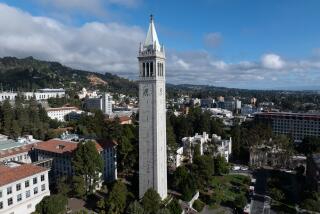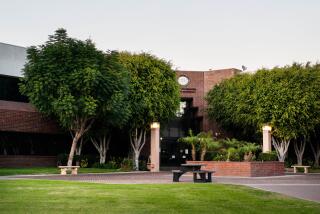Faculty Chair Believed 1st of Kind : UCSD Gets Riford Grant to Develop AIDS Cure
- Share via
LA JOLLA — A philanthropist here has donated property worth more than $500,000 to the UC San Diego School of Medicine to fund what may be the nation’s first faculty chair dedicated to studying a cure for AIDS, university officials announced Friday.
“I think it will help substantially in the sense that it will bring the university recognition as being the leader in the field of AIDS research,” said John Steinitz, UCSD’s director of planned giving. “As far as we know, this is the first chair of its kind endowed anywhere in the nation.”
The chair is the second that Florence Seeley Riford has established at UCSD to promote research into a debilitating disease. In 1983, she gave more than $1 million to endow the Florence Riford Chair for Alzheimer’s disease research.
In a statement issued by the university, Riford explained her concern with AIDS, or acquired immune deficiency syndrome, a disease especially prevalent among male homosexuals, intravenous drug users and blood transfusion recipients that attacks the body’s immune system, eventually resulting in death.
“I established the chair because AIDS is a terrible disease which is threatening to afflict all segments of our population, including even infants, and something has got to be done about it,” she said. “I think establishing the chair will help generate more funds for research to fight AIDS.”
The person who will occupy the new position will be chosen from a nationwide search of medical faculty specializing in AIDS research and will be hired by the state as a full professor, Steinitz said.
“The University of California system is such that endowed chairs cannot be used for the base salary of the person holding the position,” Steinitz said. “These (endowment) moneys are used for research, equipment, support of post-doctoral researchers, those kinds of things.”
The university is hoping the AIDS research endowment will be as fruitful as the chair for Alzheimer’s disease, which not only attracted several top researchers to UCSD, but also won the medical school millions of dollars in federal grants, Steinitz said.
This prospect gladdens those in the UCSD School of Medicine, who say funding for research has not kept pace with the exponential increase in AIDS cases over the last five years.
“AIDS has become a very serious public health problem and funding at the federal and state levels and at the private level can’t keep up,” said Leslie Franz, the medical school’s public affairs director. “An endowment like this can go a very long way toward ensuring that research currently going on can be carried through to the end.
“This really stabilizes a research program. Very creative types of research can be carried out in that kind of stable environment.”
UCSD is the primary treatment center for 50 AIDS patients, more than half of those in the county with the disease, Franz said. Additionally, UCSD researchers are studying the molecular design of the AIDS virus, its degenerative effect on the immune and nervous systems, and ways in which this information may be used in developing experimental drugs, she said.
Although many advances in AIDS research have occurred recently, such as the ability to isolate the genes that enable the virus to reproduce, Franz said, no cure for the disease is considered by UCSD researchers to be imminent.
“Lay people tend to see a breakthrough as a very cut-and-dried observation: ‘Yes, we have a drug that can cure the disease,’ ” she said. “Before you can have a major breakthrough, you’ve got to understand the nature of the virus. . . . There are many minor breakthroughs along the way.”






